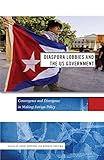Diaspora Lobbies and the US Government : Convergence and Divergence in Making Foreign Policy / ed. by Josh DeWind, Renata Segura.
Material type: TextSeries: Social Science Research Council ; 2Publisher: New York, NY : New York University Press, [2014]Copyright date: ©2014Description: 1 online resourceContent type:
TextSeries: Social Science Research Council ; 2Publisher: New York, NY : New York University Press, [2014]Copyright date: ©2014Description: 1 online resourceContent type: - 9781479818761
- 9781479811786
- 327.73 23
- JZ1480 .D53 2016
- online - DeGruyter
| Item type | Current library | Call number | URL | Status | Notes | Barcode | |
|---|---|---|---|---|---|---|---|
 eBook
eBook
|
Biblioteca "Angelicum" Pont. Univ. S.Tommaso d'Aquino Nuvola online | online - DeGruyter (Browse shelf(Opens below)) | Online access | Not for loan (Accesso limitato) | Accesso per gli utenti autorizzati / Access for authorized users | (dgr)9781479811786 |
restricted access online access with authorization star
http://purl.org/coar/access_right/c_16ec
As a nation ofimmigrants, the United States has long accepted that citizens who identify withan ancestral homeland may hold dual loyalties; yet Americans have at timesregarded the persistence of foreign ties with suspicion, seeing them as a sign ofpotential disloyalty and a threat to national security. Diaspora Lobbies and the US Government bringstogether a group of distinguished scholars of international politics andinternational migration to examine this contradiction in the realm of Americanpolicy making, ultimately concluding that the relationship between diasporagroups and the government can greatly affect foreign policy. This relationshipis not unidirectional-as much as immigrants make an effort to shape foreignpolicy, government legislators and administrators also seek to enlist them infurthering American interests.From Israel to Cuba and from Ireland to Iraq, the casestudies in this volume illustrate how potential or ongoing conflicts raise thestakes for successful policy outcomes. Contributors provide historical andsociological context, gauging the influence of diasporas based on populationsize and length of time settled in the United States, geographic concentration,access to resources from their own members or through other groups, and thenature of their involvement back in their homelands. This collection brings a freshperspective to a rarely discussed aspect of the design of US foreign policy andoffers multiple insights into dynamics that may determine how the United Stateswill engage other nations in future decades.
Mode of access: Internet via World Wide Web.
In English.
Description based on online resource; title from PDF title page (publisher's Web site, viewed 01. Nov 2023)


